Paula A. Agudelo Garcia, PhD & Andrea Acevedo Charry, PhD - Postdoctoral Researchers
Dr. Paula A. Agudelo Garcia and Dr. Andrea Acevedo Charry are two Colombian scientists born in Caldas and Huila, respectively. In this interview by Caminos en Ciencia (S2-Ep11), they tell us about their path in science and how they got motivated to pursue a career in science since early stages in their career. In Colombia, the idea that only the brightest or wealthiest students can study abroad is widely spread among students. Nonetheless, this didn’t stop Paula or Andrea of coming to the US.
Andrea studied Physics at the Universidad Nacional of Colombia, where she got very interested in molecular physics, specifically, in protein structure. This motivated her to pursue her doctoral studies in Biophysics at Cornell. She didn’t know English at first, so she attended community college in Ithaca to learn English, Biology and Chemistry. She contacted a professor at Cornell to gain experience in laboratory work, and there she learned the basics of experimental work. She applied to Cornell afterwards, successfully enrolling in a PhD in Biophysics. For her thesis, she used nuclear magnetic resonance and crystallography, to determine protein structure. For her postdoctoral studies, she continues her work on protein structure applied to medicine.
Since Paula was little, she had a profound curiosity for studying and learning more about things. Motivated by a Biology high school teacher, she decided to study Biology at the Universidad de Antioquia. Despite the limitations of studying a career in science at her home country, she moved forward with her PhD on chromatin, epigenetics and metabolism at Ohio State University. After, she decided to continue her research on similar topics, and started her postdoctoral studies just five months ago at the University of Pennsylvania.
Andrea and Paula faced diverse challenges in their academic careers, especially when involving a partner meant moving across the country and applying for jobs in very specific places. Both have expressed feelings of impostor syndrome, and how cultural aspects such as sexism related to women in science, in particular, when they have put their career as a priority over having children.
For Andrea, applying to fellowships was a stressful and unsuccessful, but that was not an obstacle to get the postdoc she wanted. The biggest challenge for Paula has been living apart from her husband, since he is now assistant professor at Detroit. For Andrea, being apart from her family and making friends every time she has had to move, in addition to her language barrier and some feelings of impostor syndrome, have been significant obstacles. Things that have helped her to overcome them include spending time doing outreach, mentoring and being mentored.
The advice they give is: “para adelante, sin miedo!” having fear can prevent you to reach your goals and dreams. We often confuse what is hard with what is difficult, and the conception that only the rich or really smart people can study abroad still lives among many Colombians. Having confidence and security in oneself, is the key.
Andrea closes the conversation by sharing this piece from a song “caminante, no hay camino, se hace camino al andar” – our paths in science are slowly being built.
Follow Dr. Paula Agudelo Garcia & Dr. Andrea Acevedo on social media: [Twitter] @Pagudelog & @andreaach16
Check out her interview in Spanish!
Special thanks to Nancy Ruiz for summarizing our interview with Dr. Paula Agudelo Garcia & Dr. Andrea Acevedo!
By Nancy Ruiz, PhD candidate in Biomedical Engineering at Cornell University.
From Bogotá, Colombia.


